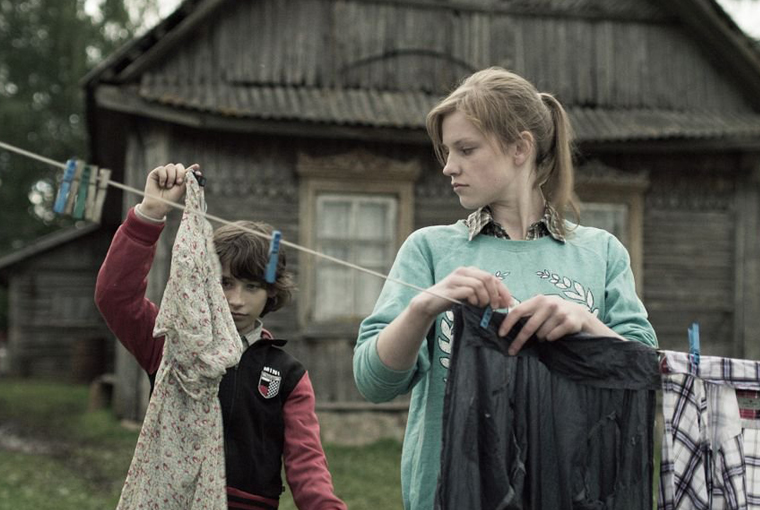Conciliatory Tones
Renars Vimba’s Mellow Mud (Es esmu šeit, 2016)
Vol. 63 (March 2016) by Konstanty Kuzma
In Mellow Mud, debut filmmaker Renars Vimba follows a young woman on her journey towards maturity. It is a journey marked by both losses and gains, in which genre conventions dictate a steady recurrence of mood swings. Though critics have lauded it for its minimalism – Vimba gets along with few characters, minor plot twists and a barren landscape -, Mellow Mud is melodramatic at times, proving unable to resist all-seems-good scenes in which we’re fooled into thinking that a happy end may well be in sight. But seeking to reconcile both us and his protagonist with her fate, Vimba shuns resolve, finally indulging in a sense of melancholy which transcends the question of “what now?”.
Self-reliant and just short of eighteen, Raya (Elina Vaska) is practically an adult. But legally she isn’t, and yet she finds that “everything’s happening now” – hardly an overstatement given that Vimba confronts his protagonist with all the hardships a teenager could possibly face. She and her younger brother Robis (Andžejs Lilientāl) have been abandoned by their widowed mother and left behind in the hands of an unloved social worker (Zane Jančevska) and their hated grandmother (Ruta Birgere). Like her fellow coming-of-age heroes, Raya feels both drawn to and repelled by adults and authority, though her rebellious side proves a little stronger than the audience may expect. When Raya returns home one day to find her grandmother lying dead on the floor, she decides not to tell anyone to avoid being put into the orphanage. Instead, she and her brother dispose of the body and set up an autonomous zone in which Raya acts as both dunning adult and understanding peer. For a while, this carrot and stick approach works suspiciously well – Raya provides for the pancakes, Robis for the grades necessary not to attract attention at school. (Curiously, it’s granny’s death that stabilizes their school careers). But after the third time or so that Raya tells unannounced visitors that her grandmother’s away somewhere, one feels that their cover’s bound to blow.
It’s Raya’s English teacher who puts the mellow into the mud. First, he allows Raya to participate in a national student competition in spite of her meagre class participation, and then he becomes her lover, producing sunset scenes that are touching, but hardly as investing as Alantė Kavaitė’s masterful sequences from The Summer of Sangailė. Perhaps, Vimba is too keen to keep the grim atmosphere of his film consistent to be able to truly shake us. But he has our attention, and I can’t deny that I rooted for Raya whenever she wanted me to. (Credits to Elina Vaska, who delivers a solid first-time performance).
As Raya turns her attention away from Robis and towards her teacher, the neglected boy starts drinking, returning severely injured one day. A nod to our incredulity, one still feels that the adventurer-would-be life envisioned by the two siblings worked for a bit too long. Is it really that easy for two teenagers to get rid of a corpse? Or to conceal a person’s disappearance? Or to live a happy life without parental care? The audience has answered these questions long before the director does. Like many coming-of-age stories, Mellow Mud struggles with over-identification. With its gruesome plot and remote setting – Robis and Raya live in a cottage far away from the village -, the film feels like a fairy tale dressed in a generic arthouse gown. Unfortunately, it’s the latter that ultimately sets the tone, as Vimba fails to deliberate any plot turns that could have made his film stand out. It is a feat that Vimba has us identify with reckless Raya, but it is one we’re never made aware of. We aren’t even asked to consider whether it was right of Raya to dump her grandmother in the swamp, or of her English teacher to sleep with her. This could be taken to reflect Vimba’s understanding of youth, which can indeed be a blind, hormone-spurred rollercoaster of emotion. Or it could reveal our contentment with films that lobby for empathy without offering us discernment in return. In this last sense, Vimba’s film fails to address a big part of maturing, which doesn’t only involve emotional growth, but intellectual one as well.




Leave a Comment